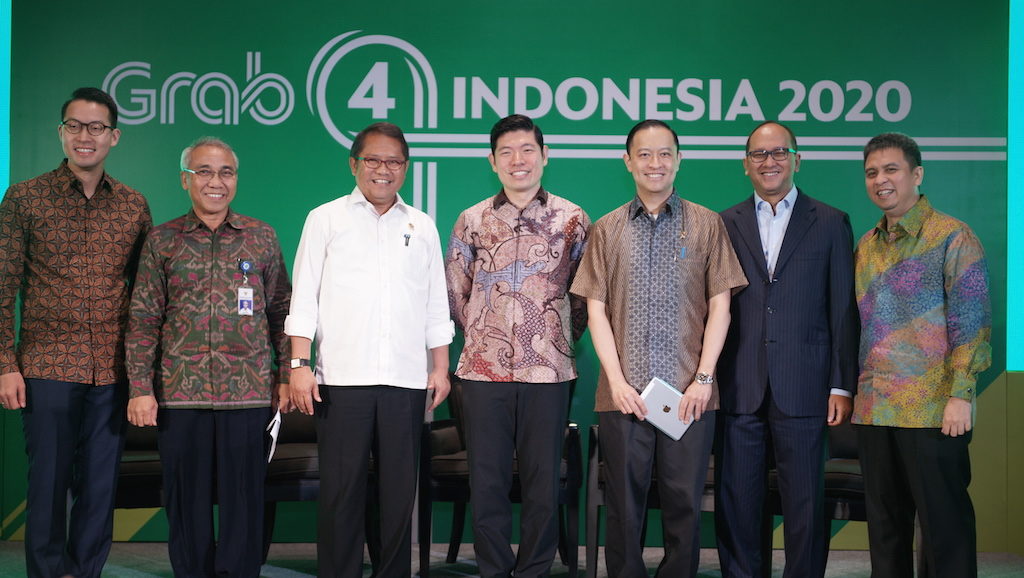
Grab Plans To Be the #1 Mobile Payments Platform in Southeast Asia
by Fintech News Singapore August 16, 2017Grab, the leading ride-hailing and logistics services startup in Southeast Asia, is looking to become the top mobile payments platform in the region. In order to “solidify its leadership in digital payments,” the firm has signed in April an agreement to acquire Kudo, an online-to-offline (O2O) e-commerce platform in Indonesia, a deal that will allow the firm to tap into Kudo’s extensive network across Indonesia’s smaller cities and rural areas.
Kudo’s payments platform will be integrated with Grab’s proprietary mobile payments platform, GrabPay. The move is intended to expand Grab’s payments ecosystem to support “the massive growth in online consumer spending in Indonesia.”
“Combining Kudo’s innovative O2O ecommerce solution and extensive agent network with GrabPay and Grab’s massive and active customer base will advance our mission of providing millions of people across Indonesia with increased access to convenient cashless payments and new income opportunities, while also unlocking compelling new ways to boost online spending,” said Ming Maa, the president of Grab.
 The Kudo platform is targeted at Indonesia’s unbanked consumers. The solution allows users to shop online by connecting them with online merchants and service providers via the Kudo network of more than 400,000 authorized agents in 500 towns and cities across the country.
The Kudo platform is targeted at Indonesia’s unbanked consumers. The solution allows users to shop online by connecting them with online merchants and service providers via the Kudo network of more than 400,000 authorized agents in 500 towns and cities across the country.
Kudo’s strong presence across Indonesia’s smaller cities and rural areas will complement Grab’s presence across the country’s major cities. Grab said it will support and accelerate the expansion of Kudo’s agent network while also leveraging Kudo’s reach to bring more riders, drivers and GrabPay users onto the Grab platform.
The two companies will explore opportunities to expand Kudo’s financial services offering with insurance products and consumer loans.
Grab 4 Indonesia: supporting Indonesia’s digital economy push
Maa said that Kudo’s integration represented an important first step in the firm’s “Grab 4 Indonesia” plan, a commitment to invest US$700 million in Indonesia over the next four years to support the country’s goal of becoming Southeast Asia’s largest digital economy.
Unveiled in February, the 2020 master plan focuses on three major investment pillars: technology talent, “technopreneurship,” and mobile payments.
Initiatives part of the plan include the opening of a research and development center in Jakarta to develop technology innovations for the Indonesian market, the launch of a social impact fund to invest in companies focused on deepening financial inclusion, and increasing access to mobile payments and financing opportunities across the country.

Grab 4 Indonesia launch
Grab 4 Indonesia has been endorsed by Badan Koordinasi Penanaman Modal (BKPM), the Government of Indonesia’s Investment Coordinating Board, and acclaimed by the public sector.
“We want all Indonesians to benefit from information technology to improve their lives, develop new skills and build the next wave of global leaders in technology,” said H.E. Rudiantara, Minister of Communication and Information Technology.
“Grab’s investment to train and hire more ICT professionals and mentor young entrepreneurs will accelerate the growth of Indonesia’s digital economy. This kind of app has to be positioned as a tool to spur and empower people and the economy.”
The plan coincides with Indonesia’s ambitious digital economy push for which the government has defined several goals such as creating 200 new startups every year, introducing more entrepreneurship programs and bringing in more mentors from the world’s leading startup hubs.
The 2020 Go Digital Vision is also targeting to get one million local farmers and fishermen to sell and promote their products online, and aims to have at least eight million SMEs using digital technologies by 2020.
Indonesia wants to become the biggest digital economy in Southeast Asia, targeting US$130 billion online transactions by 2020.
New head of GrabPay to push mobile payments development
Headquartered in Malaysia, Grab is Southeast Asia’s leading ride-hailing platform. The company operates in several markets including Malaysia, Singapore, Indonesia, the Philippines, Vietnam, Myanmar and Thailand.
Grab’s core product platform includes commuting solutions for drivers and passengers, and GrabPay, the company’s proprietary mobile payments platform.

Jason Thompson, Head of GrabPay
Jason Thompson, the former managing director of EMEA and Asia for Euronet, was appointed earlier this month as the head of GrabPay. Thompson will oversee the development of new payments technologies aimed at deepening financial inclusion and increasing access to mobile payments services across Southeast Asia.
“A large portion of Southeast Asia’s 620 million people remain unbanked and continue to use cash – a costly and unsafe way to pay,” said Thompson.
“With GrabPay, we have an incredible opportunity to provide a safe, affordable and convenient mobile payments solution for people across the region.
“I’m excited at the prospect of building out payments business from the group up.”
Grab launched GrabPay Credits, a digital wallet for the Grab app in November 2016. This was followed by GrabRewards, a regional loyalty program for ride-hailing passengers. GrabRewards has a network of more than 150 top-tier merchants across Southeast Asia, including AirAsiaGo, Deliveroo, and Spotify. A new and improved GrabRewards program launched earlier this week allows members to receive targeted rewards.
By next month, Grab users will be able to transfer GrabPay Credits to other users, allowing for instance employers to allocate credits to their employees for travels, or parents to their children.
In the next two years, Grab plans to expand its global research and development capabilities and add 800 hires, many of which will focus on developing payments solutions.
Featured image: Grab CEO and co-founder Anthony Tan (left), together with Albert Lucius, CEO of Kudo (right) upon entering an agreement for Grab to acquire Kudo.







